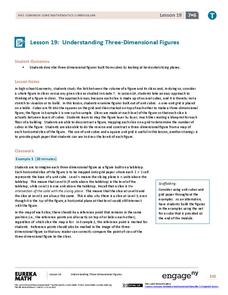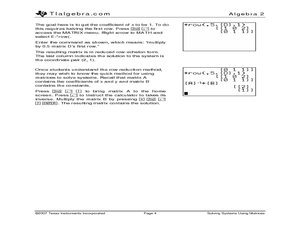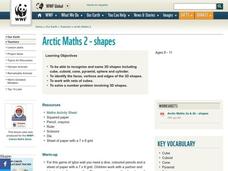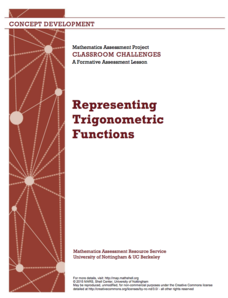EngageNY
Drawing Parallelograms
Construct your young mathematicians' understanding by exploring the properties and dimensions of a parallelogram through constructions. The seventh instructional activity in this 29-part series begins with individuals creating...
EngageNY
Understanding Three-Dimensional Figures
You can't judge a book by its cover ... or a cube structure by just one face. A creative instructional activity looks at the shape of several cube structures described by level slices. The 20th instructional activity of the 29-part...
EngageNY
Angle Problems and Solving Equations II
Demonstrate the application of algebra to geometric angle relationships with an activity that asks learners to use what they know about adjacent and vertical angles to write algebraic equations. Diagrams become more complex in this...
EngageNY
Efficiently Adding Integers and Other Rational Numbers
Develop the rules for adding rational numbers. Pupils continue to work on adding integers. Young mathematicians use their experiences to develop the rules for adding integers with like and unlike signs. They finish the lesson plan by...
Curated OER
Comparing Fractions
Young mathematicians compare two fractions with like denominators and then move to the next level to compare fractions with unlike denominators. They will first try to use mental math to make educated guesses. There are a few guidelines...
Texas Instruments
Finding Linear Models Part III
Explore linear functions! In this Algebra I lesson, mathematicians graph data in a scatter plot and use a graphing calculator to find a linear regression and/or a median-median line. They use the model to make predictions.
Curated OER
Vernier - A Speedy Slide with EasyData™ App and CBR 2™
Mathematicians use a CBR 2™ motion detector to determine their speed or velocity going down a playground slide. They also experiment with different ways to increase their speed going down the slide. Finally, students complete the Student...
Curated OER
Three-Digit Plus Two-Digit Addition (A)
Young mathematicians solve 100 problems that require adding three-digit and two-digit numbers. Regrouping is required. The answer key is provided.
Curated OER
Two-Digit Addition: No Regrouping (B)
Young mathematicians practice adding two-digit numbers without regrouping. The worksheet includes 100 problems and an answer key.
Alabama Learning Exchange
The World of Integers
Review operations related to rational numbers and integers using the include PowerPoint presentation, "Interesting Integers." Young mathematicians classify rational numbers as being natural, whole, or integers and read an article about...
Teachers' Domain
Introducing Non-Unit Fractions and Equivalents
Two Cyberchase videos inspire elementary mathematicians to understand fractions. Worksheets are provided to walk viewers through the concepts taught in the videos. You can't go wrong when using educational cartoons such as these! They...
Curated OER
Solving Systems Using Matrices
Explore the concept of systems of equations in two variables and use matrices to solve them. Young mathematicians enter coefficients and constants into a matrix and then solve using row reduction. Instructions on how to use the shortcut...
Alabama Learning Exchange
Place Value Party
Help your young mathematicians master three-digit place value with a hands-on activity that builds on their social orientation. They create a place value house from construction paper and sort "number friends" according to which house...
American Statistical Association
Armspans
Young mathematicians collect data on the arm spans of classmates. Then they sort the data by measures of center, spread, and standard deviation. Finally, they compare groups, such as boys and girls, to interpret any differences.
World Wildlife Fund
Shapes
Investigate the properties of three-dimensional figures with this Arctic-themed math lesson plan. Beginning with a class discussion about different types of solid figures present in the classroom, young mathematicians are then given a...
Mathematics Assessment Project
Representing Trigonometric Functions
Discover the classic example of periodicity: Ferris wheels. Young mathematicians learn about trigonometric functions through Ferris wheels. They match functions to their graphs and relate the functions to the context.
Illustrative Mathematics
How Many Colored Pencils?
Support young mathematicians' interpretation of place value in order to multiply single-digit numbers by 10. The task builds upon and enhances a learners' understanding of place value, a second grade skill, while introducing...
Illustrative Mathematics
1.OA, NBT, The Very Hungry Caterpillar
First graders are exposed to addition of three whole numbers in a math activity centered around Eric Carle's, The Very Hungry Caterpillar. As the teacher reads, young mathematicians use counters and ten-frames to symbolize the number of...
Illustrative Mathematics
Painting a Room
This real-life math problem concentrates on developing the understanding of dividing a unit fraction by a whole number. It allows students to draw out a solution to aid their thinking. The well-written answer sheet describes common...
Illustrative Mathematics
Above and below sea level
Using the real-world example of elevation, above or below sea level, young mathematicians interpret expressions using negative signs, and absolute value. This task provides a good opportunity to discuss the notion of magnitude and...
Illustrative Mathematics
Sugar in Six Cans of Soda
Understanding how to multiply a whole number by a fraction is the key concept. Young mathematicians create a visual model of this real-world example and find the solution. Extensions are possible for making this an even richer activity....
Illustrative Mathematics
Assessing Writing Numbers
Can I say a number by its name, and can you write it for me? Working in small groups or with the whole class, give your kindergartners a piece of 1-inch graph paper and have them write numbers 0 to 10 and 11 to 20. Next, pass out blank...
Curated OER
Five by Two
Help young mathematicians read and interpret numbers from 1 to 10 and sequence them correctly with this card game. Using a deck of cards and two to three classmates, have one player hand out ten cards to each gamer and then put the extra...
Curated OER
Number TIC TAC TOE
Working in pairs, young mathematicians will practice number identification with a game of tic-tac-toe. Supplies needed: two 3x3 grids with numbers 1-9 in random order, and two different colored crayons. Player 1 will choose and read a...
Other popular searches
- Famous Mathematicians
- Great Mathematicians
- 5 Great Mathematicians
- Female Mathematicians
- Projects on Mathematicians
- Five Great Mathematicians
- The Great Mathematicians
- Mathematicians Fibonacci
- List of Great Mathematicians
- Hall of Great Mathematicians
- Whorls Famous Mathematicians
- The Old Grete Mathematicians






















